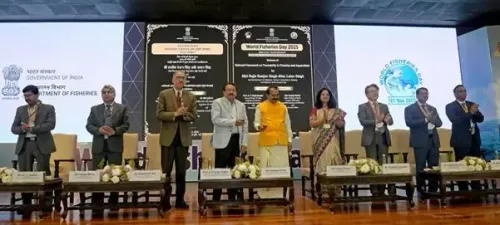How Can NITI Aayog's Urban Data Ecosystems Drive Growth and Employment?

Synopsis
Key Takeaways
- Urban data ecosystems can drive economic growth.
- Evidence-based strategies are essential for planning.
- Partnerships with academia and international bodies enhance knowledge sharing.
- Technologies like AI and ML can improve governance.
- Strong data foundations are critical for sustainability.
Bhopal, Nov 21 (NationPress) The NITI-State Workshop titled ‘Urban Data Ecosystems for Growth, Jobs and Service Delivery’ under the State Support Mission (SSM) wrapped up on Friday, focusing on how effectively designed urban data ecosystems can empower cities to gather and utilize data proficiently for crafting strategies aimed at boosting economic growth.
The SSM initiative by NITI Aayog seeks to promote structured and institutional collaborations with States and Union Territories. This workshop represents a significant milestone in collaborating with State governments, fostering a bottom-up approach driven by evidence-based data to attain socioeconomic development objectives, as stated by an official announcement.
Conducted in partnership with the Government of Madhya Pradesh and the World Bank, the event saw participation from over 100 attendees, including representatives from the Centre, State governments, the World Bank, academia, and subject matter experts.
During the workshop, NITI Aayog's commitment to enhancing data-driven governance in India was emphasized, along with the launch of the City Data and Analytics Platform (CDAP), a specialized micro-site of the National Data and Analytics Platform (NDAP).
The CDAP aims to bolster evidence-based urban governance by offering a consolidated, user-friendly interface for cities to access, analyze, and visualize high-quality urban datasets. This platform will assist policymakers, researchers, and practitioners in drawing insights for improved planning, enhanced service delivery, and more informed decision-making, marking a vital advancement towards establishing robust, data-driven urban ecosystems in India.
The Data Forum centered around four essential thematic areas crucial for shaping India’s future-ready urban landscape. It discussed the importance of creating strong data foundations by enhancing institutional frameworks, data governance mechanisms, and standards to facilitate resilient and interoperable urban data systems.
Conversations also highlighted how data can establish cities as engines of growth and job creation by informing economic visioning, steering equitable development, and enabling strategic policy interventions. The Forum underscored the significance of data in enhancing participatory urban planning, improving service delivery timelines and quality, and promoting sustainable urban development. Additionally, it investigated frontier technologies, such as AI and ML innovations, to strengthen real-time city operations, enhance monitoring abilities, and support data-driven governance and decision-making.
Best practices were shared by representatives from various States, along with insights from academic experts. Representatives from the Government of India also detailed ongoing efforts at the central level to develop robust data systems and highlighted how States can utilize these frameworks to bolster their planning and decision-making processes.
World Bank representatives presented global best practices, including the development of business economic registers, sub-national growth estimation, and utilizing data for enhanced living standards.









